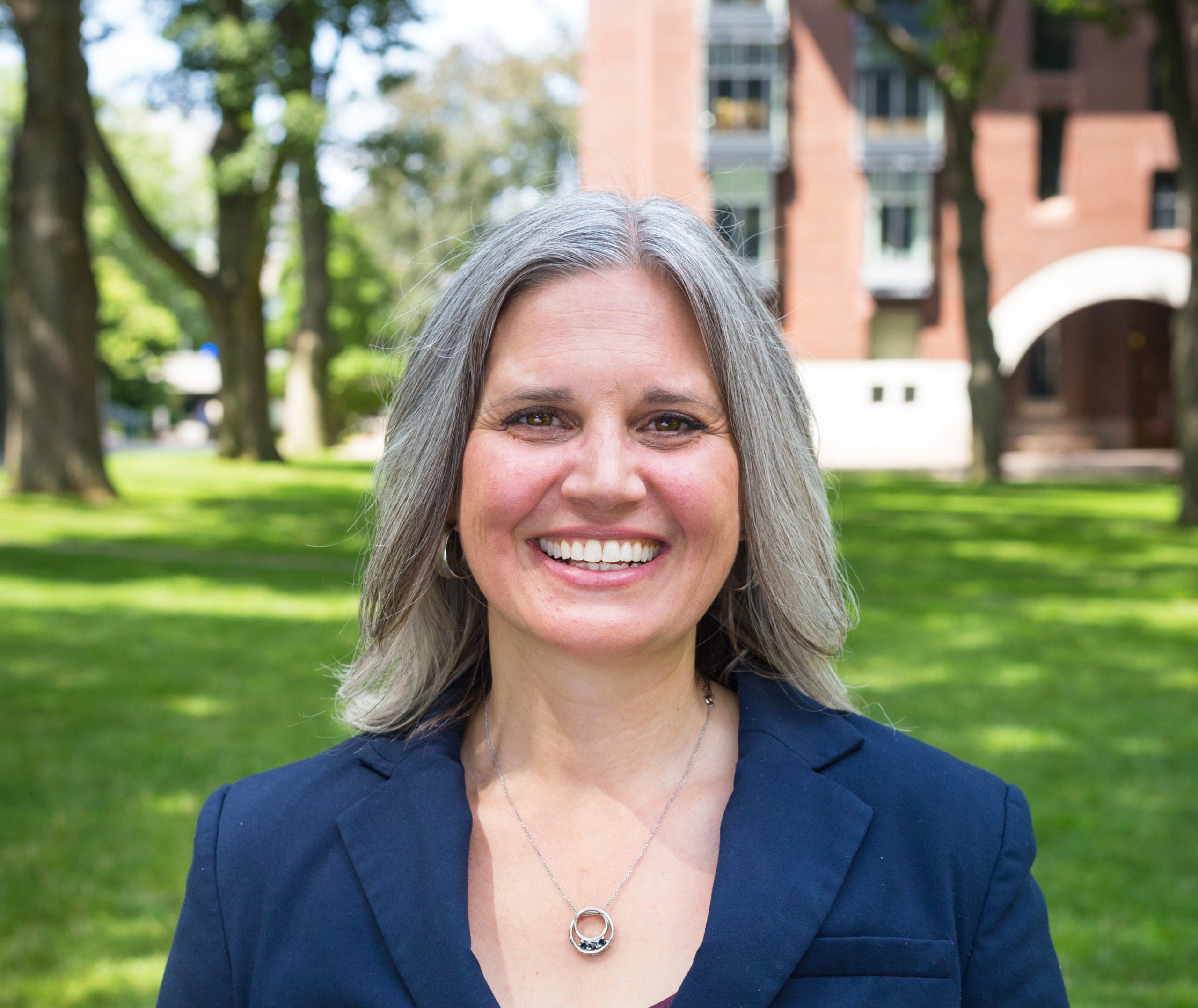Health care, the federal budget, climate change, immigration, crime — there is no shortage of hot button issues in the United States, nor opinions on them. But despite the need to work together to find solutions, nearly 60 percent of Americans say that it is “stressful and frustrating” to have conversations with those who have opposing political viewpoints, according to a recent Pew survey.
The Harvard Negotiation and Mediation Clinical Program is working to change that. Rachel Viscomi ’01, a clinical professor of law and director of the Harvard Negotiation and Mediation Clinic, along with Neil McGaraghan, a clinical instructor and lecturer on law, and Morgan Michele Franklin ’17, a clinical instructor and lecturer on law, teach courses on how to have empathetic and productive conversations with those who hold different views.
In an interview with Harvard Law Today, the trio explain why constructive dialogue has declined in recent decades, how to reverse the trend, and why it’s critical for lawyers — and everyone else — to learn how to have discussions about the issues facing our nation.
Harvard Law Today: In the description of one of your courses, Political Dialogue in Polarized Times, you write that genuine dialogue across differing political viewpoints has declined in both public and private spaces over time. Why do you think that happened?

Neil McGaraghan: I think the reasons are twofold. In public spaces — and you can think about this from a national congressional level on down to state legislatures — we have noticed over time increasing polarization, the absence of an apparent interest in working through polarized views, and an absence of our elected representatives being engaged in thoughtful discussion of issues and solutions. This is also reflected in the way their voting happens. Over time, the data show, members of Congress have been voting more and more closely aligned with their own party — and not only with their own party, but further from the center. You can see the effect of the absence of dialogue and the absence of genuine discussion of different perspectives in the polarized outcome of voting.
Then, if you think about the spaces that people outside of our elected representatives inhabit, there has been a move toward spending more time in online spaces and on digital platforms, where people tend to find others who sound like them and think like them. This can eliminate a lot of opportunity for genuine dialogue between people of different views. Here, too, I think the data show that people are sorting themselves into communities where they find more and more people who think like them.
All this reflects a fundamental disagreement on who we are — a fundamental view of how people see “others.” People tend to identify with the folks on their side of the political spectrum, even if it doesn’t necessarily tie to political views, and begin to demonize people that they view as being on the other side of the spectrum. That demonization prevents people from being able to engage with those who think differently than they do.
HLT: Why is it important that people — and law students in particular — have conversations with others who don’t think like them?
McGaraghan: There are a lot of reasons, but perhaps one of the most important is that we have to make decisions on big issues that affect a lot of people in really important ways, in areas like immigration, the environment, how to handle the response to COVID-19, education, racial justice, and more. If we can find ways to talk about these things and understand each other, we might actually help make progress towards finding creative solutions, or finding ways of improving people’s lives, that are beneficial to everybody. But if you don’t have people talking with one another, getting them to see joint solutions and ways of approaching each other with some humanity, the chances of solving those kinds of big important issues seem pretty small.
We want to encourage students to start thinking and practicing these conversations now, to prepare them to be part of the world they are entering, where they can make a real difference.
Neil McGaraghan
Another thing many of us have noticed in the last couple years is an increasing mistrust in government, the institutions of government, and the levers of democracy. Much of that appears to be driven also by people’s inability to appreciate each other, hear each other, see each other, and understand each other as human beings. The effect is that there is a perception of democracy as a faltering institution. Introducing people to each other across viewpoints and across perspectives, and across lived experiences, might help them to see that there is hope for what it means to engage in a democratic society.
As for why it’s important to have these discussions at Harvard Law School? Harvard students are people who are likely to be involved in tackling some of the issues that I mentioned in a lot of really important ways. They’re going to be members of Congress and Supreme Court justices. We want to encourage students to start thinking and practicing these conversations now, to prepare them to be part of the world they are entering, where they can make a real difference.
HLT: How can we approach polarizing topics with those with whom we deeply disagree? Do the tactics change if we’re talking to a colleague, as opposed to a member of our family?

Rachel Viscomi: The approaches are similar, although the felt experience can be extremely different. Ideally what we would hope for in these conversations is that you approach the other person with curiosity, and in a way that allows you both to hold your own truth and way in which you see the world, and also opens up some space to be curious about how the other person sees it.
That said, I think the challenge looks different depending on who you are talking to. If we’re talking to a stranger, and we don’t have a lot of context about them, sometimes we can make up a story in our head about who they are, or why they believe something, which can make it hard to be curious. If we’re talking to a colleague, and we value that relationship, sometimes it can be easier, because we give them the benefit of the doubt that there is some logic to what it is that they’re thinking. We may be more careful in the way that we approach the conversation, and more likely to imagine that we don’t know the full picture. We may also have a different capacity for curiosity depending on the topic, and depending on how our identity relates to it.
A big key to success in these types of conversations is just slowing things down, being able to make space for our own emotional reactions and the emotional reactions of the people that we’re talking to, and trying to navigate our way to some curiosity.
Rachel Viscomi
With family, I think it can be tricky. Often we value the relationship, but the strength of the relationship itself means that we often think it can withstand more strain. We’re likely to employ fewer filters with family members. We sometimes have a little curiosity about their perspectives, because we feel like we know what they will say and how they’re going to approach the topic before the conversation even begins. And so we are sometimes less curious and less open, because we don’t hold open the possibility that they might have an answer or perspective or experience that is different than what we’re expecting.
There’s an article by Z.D. Gurevitch called “The Power of Not Understanding,” and one of the things he talks about is how often we go into these conversations thinking “let’s find our common ground.” But this can mean we miss the chance to see the ways in which we are not the same, and to really hold space for otherness, and open up the possibility that your narrative might not fit within mine, and that I need to let go of the way that I am seeing things in order to really hear and appreciate your experience. That can be extremely hard to do, especially with family, because we think of our narrative and their narrative as being the same, and it isn’t always.
A big key to success in these types of conversations is just slowing things down, being able to make space for our own emotional reactions and the emotional reactions of the people that we’re talking to, and trying to navigate our way to some curiosity before we before we jump in with our certainty and with our answers.
HLT: Does it matter if the two sides don’t agree on the fundamental facts on which their conversation is based? For example, if one side points to scientific findings to bolster their argument, and the other refers to social media posts, how can a productive conversation move forward?

Morgan Franklin: It absolutely matters if we are operating from a different set of facts or a different understanding of the basis on which our conversation rests. But in thinking about what it looks like to move forward with a productive conversation, it’s important for us to step back and think about the actual purpose of the conversation and what we are trying to achieve. We can come together across difference and try to figure out a pathway forward.
In these cases, it’s important to think about engagement around empathy, and also engagement around assertion. Sometimes people think that those two constructs are mutually exclusive, and you can’t lean into one and at the same time, lean into the other. But in actuality, when you’re thinking about what it looks like to assert your understanding of the world and what you hope to gain from the conversation, that requires a significant level of empathy.
In thinking about what it looks like to move forward with a productive conversation, it’s important for us to step back and think about the actual purpose of the conversation and what we are trying to achieve. We can come together across difference and try to figure out a pathway forward.
Morgan Franklin ’17
In particular, when you’re thinking about the empathy that you might employ as you engage in a conversation with another who’s operating from a different set of facts, you might think about two different strains of empathy. The first is cognitive empathy: Can I simply understand the other person’s perspective? Do I understand what it is that they’re saying? Or, how, given whatever they have latched on to as a basis for their points, they may have gotten to a particular outcome?
The second piece is something that I think that we don’t spend as much time thinking about, which is the emotional empathy piece. What would it be like if those things were true? Or if you really believed what this other person believes about the world? Can you lean in to the emotional experience that the other person is having? Can you lean into what they are navigating? And, as we think about what it means for these conversations to be productive, just getting to a point where you are capable of not only having this sort of cognitive empathy engagement, but also emotional empathy engagement, can be a very powerful experience.
HLT: What happens if we don’t try to have more of these types of difficult conversations in our daily lives?
Franklin: The first thing I want to say is that there are some versions of the world in which it is completely reasonable to not have a conversation like this. An example would be if you’re in a conversation and you feel like your lived experience is being marginalized, or you feel like your humanity is being threatened, or you feel like you’re in a role in which it might be actively harming you to engage. In that case, it makes complete sense to step away from a conversation and to use your time in a different pursuit.
But if we think about what it looks like to miss out on these conversations more generally, if we are trying to solve these larger, societal problems, and we are only attempting to solve them with one or two perspectives, we’re missing out on a panoramic view of what’s happening in the world, and any solutions that we would come up with would be necessarily incomplete. There would be certain lived experiences that would be missing. There would be certain truths that would be missing from our engagement. And so, we could be forced to continually reengage with the same problems, because we didn’t actually address them fully the first time. It’s really important that we try and understand as many perspectives as we possibly can, so that our solutions to problems are complete – or as complete as they possibly can be.
